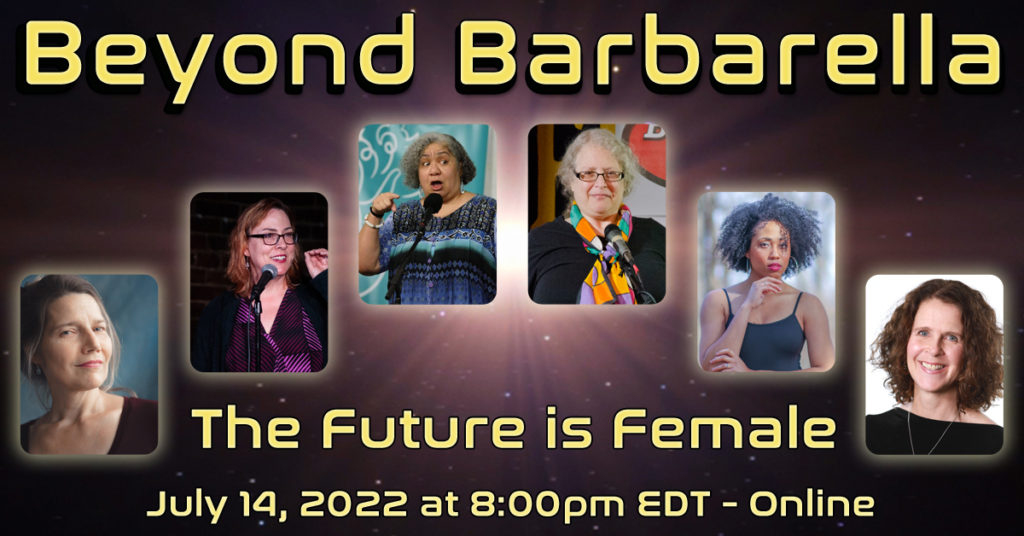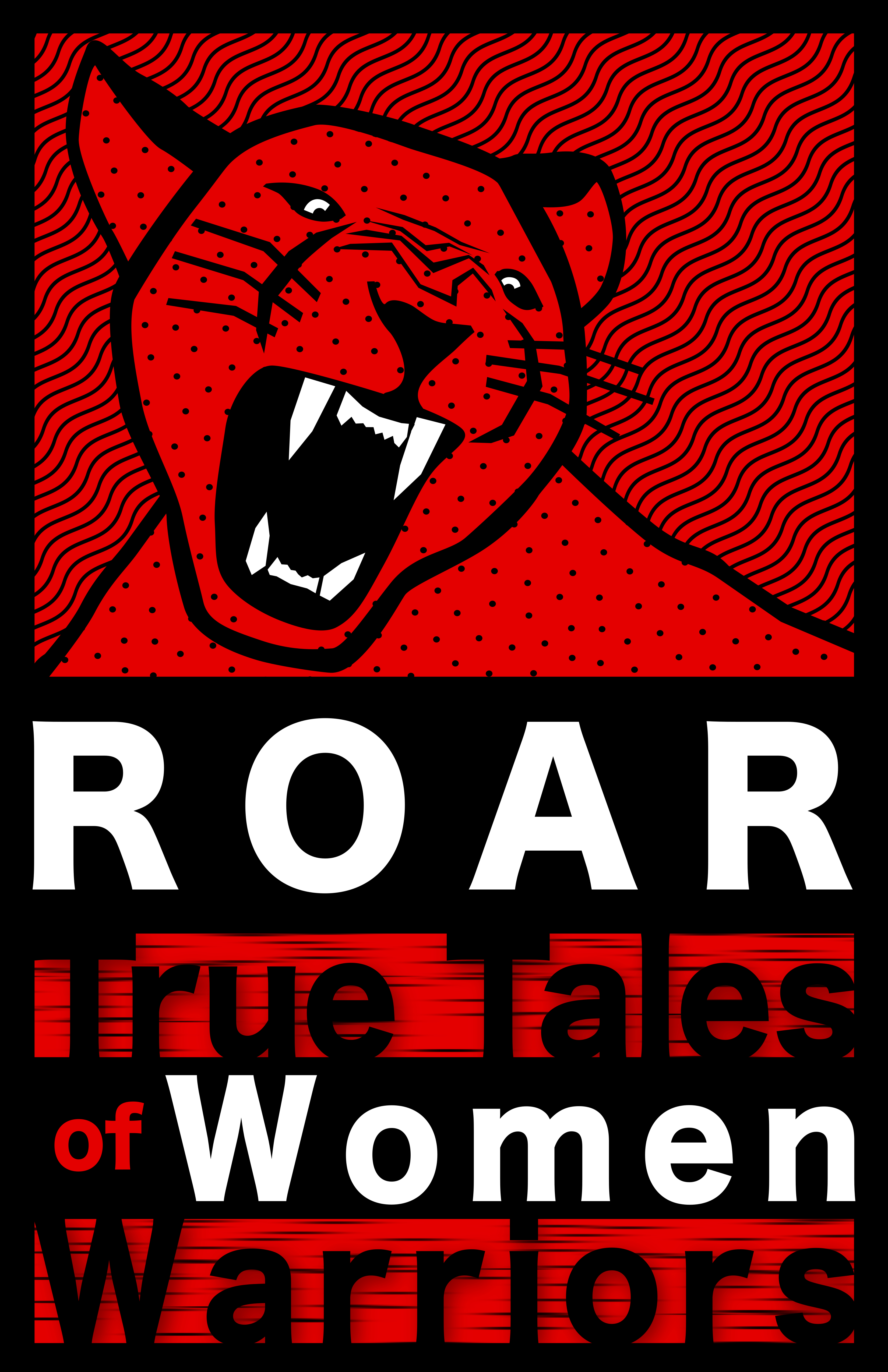On July 14, 2022, storytellers Lyn Ford, Carol Moore, Miriam Nadel, Ingrid Nixon, Jessica Robinson, and Megan Wells will perform in “Beyond Barbarella: The Future is Female.” We asked them a little about their history with speculative fiction. Read their thoughts below.
Read the storyteller bios here and then GET YOUR TICKETS TO WATCH HERE!

Jessica Robinson explains a bit about the show, “The idea of a sci-fi storytelling show came about because I didn’t think anyone had done it before. And then the concept of “The Future is Female” came to me when all of the storytellers who signed up for the show were women. Ingrid Nixon actually came up with the title “Beyond Barbarella,” which we were all immediately drawn to.”
Miriam Nadel said, “My recollection of Barbarella is that: 1) Jane Fonda dressed in a “chicks in chainmail” aesthetic and 2) while she was supposed to be saving the world, she kept having to get rescued. I hope by now we let women wear practical clothes and have their own agency.” Or as Megan Wells put it, “We are so much more than our bodies! Barbarella would still be a powerhouse even if she wore a potato sack.”
Lyn Ford added, “In so many ways, woman have pushed far beyond the “sex kitten in uncomfortable metal space wear” image that was imposed on us, and we don’t intend to go back.” And extrapolating on the subtitle “The Future is Female,” Ingrid Nixon continued, “To me it goes beyond women. It means gender equality and women will have an equal voice at the table, along with all people no matter how they identify. (Women are not afraid to have other voices at the table.) But after the recent Supreme Court decision, I feel like it is going to take much longer to get there. However, I feel like survival of human life on this planet depends on it.”
As this is billed as a science fiction storytelling show, Jessica Robinson explains what makes a story science fiction. “Science Fiction is a more specific term than speculative fiction – which I think a lot of us nerds prefer. But Sci-fi is easier to say. Rolls off the tongue. The definition of science fiction, to me, is a fictional story that involves science or the outcome of science. In other words, it can be heavy on the science – like an Andy Weir novel, or it can be more of a story which takes place in a world in which science has run amok – like The Mitchells vs. the Machines. Fun fact – science is everywhere. It’s kind of like nature. (Hey, nature is science too!) So, really, in a broad sense, science fiction can just mean fiction. But whether it’s actually called SF depends on there being an element that can be tied to a central scientific theme.” Or, as Lyn Ford sums it up, “Creative narrative play within the possibilities of science. I guess that’s why sci-fi is now referred to as “speculative fiction”.”
Carol Moore take on science fiction is more specific. “It’s not sci-fi to me unless someone or everyone has amazing powers and/or is familiar with a variety of planets. Gotta throw the alternate worlds in there for sure.”
As to whether these storytellers have ever written sci-fi stories before, there is a range. Miriam Nadel said, “I wrote some science fiction stories in high school and college writing classes. I hope there are no existing copies left.” For Ingrid Nixon, this was a new experience, “I have never taken on a science fiction piece before. It’s been an interesting challenge. Funny, one accepts all sorts of magic in fairytales, like someone just appearing in a puff of smoke. The same kind of thing occurs in science fiction, only it involves one accepting the concept of teleportation. Maybe I should read more science fiction with that kind of lens?” For Carol Moore as well, “Most of my writing is usually creative nonfiction or poetry, so I actually didn’t write my first science fiction piece until about a year ago. It was one of the most challenging things I’ve ever done, which is why I was so excited to be a part of this show. I knew it would push my creative limits, and I rather enjoy that!”
Jessica Robinson has a little SF writing experience, “I’ve even had stories published. Oh, and there was that novel I wrote about vampires and zombies called Caged, published under pen name JP Robinson.”
Whether or not the storytellers of Beyond Barbarella have written a lot of science fiction, they have certainly read and watched plenty of it. Megan Wells is a big fan of the genre, “I am completely a fan of Science Fiction – there isn’t much I haven’t read. I’m currently devouring The Parable of the Sower, by Octavia Butler.” Lyn Ford’s tastes traverse screen and page, “I’m a Trekkie, a Whovian, and a former Comic-Con volunteer. I’m rereading Ray Bradbury and Octavia Butler (Parable of the Sower is so relevant now!).”
Miriam Nadel adds to the list, “Growing up, I read my brother’s Tom Swift books and a lot of comic books and I watched TV shows like The Jetsons and Time Tunnel. By junior high, I had discovered things like Kurt Vonnegut’s Cat’s Cradle. In high school, I read Isaac Asimov’s Foundation Trilogy. Of more recent science fiction, I am a huge fan of Jasper Fforde, including the Thursday Next books. But my all-time favorite is George Alec Effinger’s short stories about Maureen Birnbaum, Barbarian Swordsperson, in which he places a Tulane sorority girl in various science fiction settings. Looking at this reminds me I need to seek out science fiction by women!”
Jessica Robinson describes herself as a “Total nerd. Kaleidoscope, a short story by Ray Bradbury, is one of my favorite short stories of all time. They turned it into a great radio play. And the movie Gravity is very strongly influenced by the story. I’ve also recently really enjoyed the Murderbot series, by Martha Wells, The Silo Saga, by Hugh Howie, the Until the End of the World series by Sarah Lyons Fleming, The Expanse books and TV Show by James S.A. Corey, and the Red Rising series by Pierce Brown.”
And Carol Moore has taken her fan-dom a bit further, “The Marvel cinematic universe is hands down my favorite sci-fi adventure series. I love what they’re doing with representation and storyline adaptation from the comic books. And also the powers. I enjoy characters who have enhanced abilities. They are my people. After months of debating, I finally purchased my first official cosplay outfit two years ago: Marvel’s Black Widow. I’ve made tiktok videos in it and everything (ok just one video, but I think it’s awesome, and I definitely have ideas for others). My next step? Learning some fight choreography and wearing the outfit to Comic-Con. Unapologetically.”
As to why this show, or science fiction in general, is relevant or important, Ingrid Nixon explains, “As someone who is intrigued by human psychology, I have read a bit of social science fiction and find that by taking human issues and putting them in an altered universe, it is in some ways easier to focus on the issues being explored.” Jessica Robinson adds, “Times are rough. Mentally, I can never settle on what horrific news item to be upset about next, what crisis to try to take action on next. Speculative fiction is often about real world problems – those that affect us now, or that we will be facing in the future. Somehow, it is easier to see those problems more clearly, to address them in my mind, at least, in fiction than in reality. In a way, SF stories help me focus in the real world.”
These storytellers are worlds beyond Barbarella! Watch them show that the future is female on July 14th.
Get tickets here!

